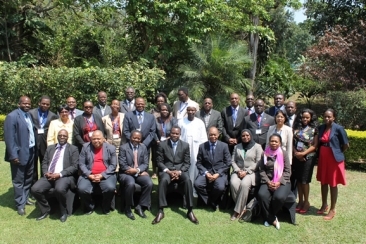
African think-tanks have been challenged to add value to homegrown policy recommendations by sharing among themselves their experiences and knowledge.
At the Policy Institute Committee (PIC) meeting bringing together representatives from 14 countries in Mbabane, Swaziland’s Minister of Finance, Mr. Martin G. Dlamini urged the think tanks to share their experience and strengthen their capabilities in order to add value to home-grown policy recommendations.
The PIC is a strategic network which regroups the African Capacity Building Foundation’s (ACBF) supported policy institutes across Africa.
Representing the ACBF’s Executive Secretary, Dr Roger Atindehou, Manager for the ACBF East and Southern Africa Operations Department, stressed the importance of think tanks’ sharing and exchanging practices, as this is another way to improve their performance.
The theme of this third PIC meeting was “Toward Africa’s Sustainable Development: Role of ACBF’s Policy Institutes Committee”. Those in attendance used the platform to share experience and knowledge on resource mobilization; the role of think tanks in regional integration in a rising Africa; and country policy and institutions self-assessment.
The meeting also examined the draft country-reviews on Swaziland and Zimbabwe, which focused on the capacity development imperatives.
Findings showed that Swaziland has investment opportunities, but is experiencing low economic growth, exasperated by the shortage of human resource skills, health and gender mainstreaming issues and institutional constraints.
The performance of Zimbabwe is mainly affected by the financial instability, fiscal space constraints and de-industrialization.
Both countries showed weaknesses in implementing the different strategies and policies, and therefore the need to enhance their capacities in this regard.
On PIC’s experiences on resource mobilization, the key message was that grants remain a critical source of funding for think tanks, as they prevent them from losing focus of their main mandate (the production of public goods), and transforming into private consultancy firms.
The participants also discussed the country policies and institutions self-assessments that some ACBF-supported think tanks have been conducting since the inception of the Africa Capacity Report. They recommended extending the exercise to all African countries, because the assessment serves to inform policy decisions and the areas to for capacity building interventions.
The role of thinkers with regard to the Ebola virus disease outbreak was also discussed. Participants unanimously agreed that it is imperative to conduct studies to document cases of best practices in containing the disease, and further evaluate its impact on the economies of the affected and non-affected but neighboring countries.
At the close of the meeting, the PIC Chair, Mr Boubacar Macalou, Director of the Centre d’Etudes et de Renforcement des Capacités d’Analyse et de Plaidoyer (CERCAP), from Mali, encouraged the members to keep the momentum in exchanging ideas on pertinent issues related to Africa’s development agenda while paying attention to peer-learning and quality work.
The next meeting of the PIC is planned to be held in April 2015.





